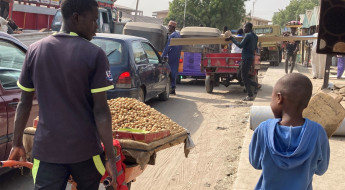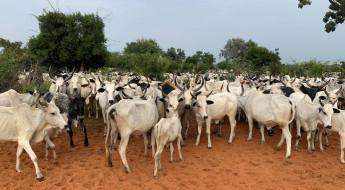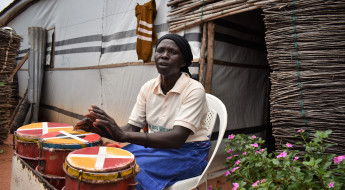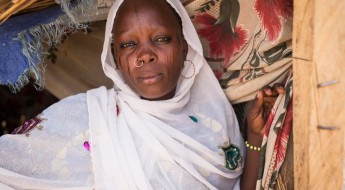Critical food shortage for those fleeing conflict in North East Nigeria
 A family, displaced from their village in Mafa, arrive at the outskirts of Maiduguri. With little food or water, most of those displaced walk for more than three days to reach Maiduguri.Mackenzie Knowles-Coursin / ICRC
A family, displaced from their village in Mafa, arrive at the outskirts of Maiduguri. With little food or water, most of those displaced walk for more than three days to reach Maiduguri.Mackenzie Knowles-Coursin / ICRC Newly arrived IDPs sit amid their belongings and try and protect themselves as a dust storm rips through Maiduguri.Mackenzie Knowles-Coursin / ICRC
Newly arrived IDPs sit amid their belongings and try and protect themselves as a dust storm rips through Maiduguri.Mackenzie Knowles-Coursin / ICRC Young children receive food from ICRC staff on the outskirts of Maiduguri. Along with over 450 others that day, the children arrived after being forced to flee their homes. According to the UN, there are 15 million civilians directly affected by the violence in North East Nigeria of whom 7 million people in need of assistance, including 2.4 million IDPs – more than 50 per cent of whom are children.Mackenzie Knowles-Coursin / ICRC
Young children receive food from ICRC staff on the outskirts of Maiduguri. Along with over 450 others that day, the children arrived after being forced to flee their homes. According to the UN, there are 15 million civilians directly affected by the violence in North East Nigeria of whom 7 million people in need of assistance, including 2.4 million IDPs – more than 50 per cent of whom are children.Mackenzie Knowles-Coursin / ICRC Halima cradles her son Aboubacar in the State Specialist Hospital in Maiduguri. Aboubacar was diagnosed with chronic diarrhea, severe malnutrition, bronchopneumonia, and malaria. Despite receiving emergency treatment, Aboubacar's condition has not been improving.Mackenzie Knowles-Coursin / ICRC
Halima cradles her son Aboubacar in the State Specialist Hospital in Maiduguri. Aboubacar was diagnosed with chronic diarrhea, severe malnutrition, bronchopneumonia, and malaria. Despite receiving emergency treatment, Aboubacar's condition has not been improving.Mackenzie Knowles-Coursin / ICRC Aboubacar comforts his 11-year-old daughter Houwa in the State Specialist Hospital in Maiduguri. Houwa is suffering from malnutrition.Mackenzie Knowles-Coursin / ICRC
Aboubacar comforts his 11-year-old daughter Houwa in the State Specialist Hospital in Maiduguri. Houwa is suffering from malnutrition.Mackenzie Knowles-Coursin / ICRC Yunus is weighed at the State Specialist Hospital in Maiduguri. Both he and his sister, Houwa, are suffering from malnutrition but their conditions are slowly improving after receiving medical attention.Mackenzie Knowles-Coursin / ICRC
Yunus is weighed at the State Specialist Hospital in Maiduguri. Both he and his sister, Houwa, are suffering from malnutrition but their conditions are slowly improving after receiving medical attention.Mackenzie Knowles-Coursin / ICRC Ayshe, a young woman displaced from her home in Dikwa, stands in Muna IDP informal camp on the edge of Maiduguri.Mackenzie Knowles-Coursin / ICRC
Ayshe, a young woman displaced from her home in Dikwa, stands in Muna IDP informal camp on the edge of Maiduguri.Mackenzie Knowles-Coursin / ICRC Displaced women wait beside stacks of food being distributed by the ICRC in Muna IDP informal camp on the outskirts of Maiduguri.Mackenzie Knowles-Coursin / ICRC
Displaced women wait beside stacks of food being distributed by the ICRC in Muna IDP informal camp on the outskirts of Maiduguri.Mackenzie Knowles-Coursin / ICRC Fathers with sick children talk to an ICRC staff member in Muna IDP informal camp on the edge of Maiduguri.Mackenzie Knowles-Coursin / ICRC
Fathers with sick children talk to an ICRC staff member in Muna IDP informal camp on the edge of Maiduguri.Mackenzie Knowles-Coursin / ICRC A mother who has just arrived at Maiduguri after fleeing her home feeds her child.Mackenzie Knowles-Coursin / ICRC
A mother who has just arrived at Maiduguri after fleeing her home feeds her child.Mackenzie Knowles-Coursin / ICRC Hospital staff tend to Houwa and Yunus, two children suffering from malnutrition, at the State Specialist Hospital in Maiduguri.Mackenzie Knowles-Coursin / ICRC
Hospital staff tend to Houwa and Yunus, two children suffering from malnutrition, at the State Specialist Hospital in Maiduguri.Mackenzie Knowles-Coursin / ICRC Men fill in the grave of a young child after burying him at the edge of Maiduguri. The one-year-old child and had been sick for one week.Mackenzie Knowles-Coursin / ICRC
Men fill in the grave of a young child after burying him at the edge of Maiduguri. The one-year-old child and had been sick for one week.Mackenzie Knowles-Coursin / ICRC
More than 2.4 million people have fled their homes due to the conflict in North East Nigeria.
The humanitarian situation is further deteriorating as many displaced are located in hard-to-reach areas, with limited or no access to humanitarian assistance. Other internally displaced people are hosted by low-income communities, bringing already stretched services and resources under renewed pressure. The situation of the most vulnerable, such as children, women and the elderly is of particular concern.
Most who have abandoned their homes leave everything behind, and lack many of the very basic necessities. In some places, children are dying of malnutrition and other diseases. The situation also remains complex, as some have been displaced for a very long time, while others have had to flee on multiple occasions. Generally, it is the recent arrivals to the camps who are also in the most dire need of humanitarian assistance.




